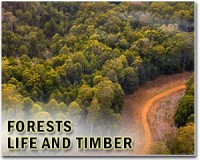| . |  |
. |
Kew UK (SPX) Feb 23, 2011 Prescribed burning to reduce the hazards of bushfires may do more harm than good in some circumstances, according to a group of leading environmental scientists. From The University of Western Australia, Kings Park and Botanic Garden, and the Royal Botanic Gardens, Kew, England, the scientists argue that deliberately increasing the frequency of fires may lead to ecosystem degradation and loss of biodiversity. In a paper published this month in Trends in Plant Science they acknowledge that as climate change increases the combustibility of vegetation, human lives and property are more at risk. However, they suggest that prescribed burning - a key practice by most environmental managers - may cause more problems because, they say, there is actually little evidence that Mediterranean-climate plants such as those found in Australia are fire-adapted. Director of the Royal Botanic Gardens, Kew, and UWA graduate Professor Stephen Hopper said: "Dealing with fire management is a complex business, especially when the dual aims of protection of life and property and of biodiversity conservation coincide. "Our analysis reveals that it is naive on present evidence to assume that Australian plants are adapted to fire, and that prescribed burning regimes are not only good for the bush but can be applied in any fashion and frequency with impunity. Rather, we should be cautious in prescribed burning practices if biodiversity conservation is an aim, ensuring that good scientific design and adaptive management are applied to local situations, so that we learn as we go. "Our paper is a plea for better science and closer working relationships between fire managers and scientists to achieve the best outcomes for biodiversity conservation where that is a priority." The paper's authors argue that the role of fire in engendering adaptive traits in Mediterranean plants has never been tested. Traits traditionally regarded as evidence of adaption to fire, including smoke-induced germination, co-occur in ecosystems which are not fire-prone and also stimulate germination in plants such as lettuce and tomatoes, they write. "Mediterranean climates and their unique ecosystems are only found on five per cent of the land surface of the Earth, yet they contain 20 per cent of the plant species of the world. The effective management and long-term protection of their biodiversity is a priority that is being made increasingly difficult by human population pressures and the as-yet not fully understood impacts of climate change," the authors write. "Preventing an increase in fire frequency - instead of prescribed burning - can be crucial for maintaining soil integrity, water supplies, water quality and biodiversity. Suitable management practices are therefore difficult to predict." Bradshaw, S.D., Dixon, K.W., Hopper, S.D., Lambers, H. and Turner, S.R. (2011). Little evidence for fire-adapted traits in Mediterranean climate regions. Trends in Plant Science 16, 69-76.
Share This Article With Planet Earth
Related Links University of Western Australia Forestry News - Global and Local News, Science and Application
 Forests under threat as Armenians turn off the gas
Forests under threat as Armenians turn off the gasByurakan, Armenia (AFP) Feb 18, 2011 The Karapetians' house in the village of Byurakan lies under heavy snow, its chimney belching smoke from the iron stove which helps the family to survive the long, harsh Armenian winter. The Karapetians say that they spend most of the winter months huddling around the stove for warmth in the middle of their tiny, sparsely furnished living room. "We use the stove to heat the house and wat ... read more |
|
| The content herein, unless otherwise known to be public domain, are Copyright 1995-2010 - SpaceDaily. AFP and UPI Wire Stories are copyright Agence France-Presse and United Press International. ESA Portal Reports are copyright European Space Agency. All NASA sourced material is public domain. Additional copyrights may apply in whole or part to other bona fide parties. Advertising does not imply endorsement,agreement or approval of any opinions, statements or information provided by SpaceDaily on any Web page published or hosted by SpaceDaily. Privacy Statement |